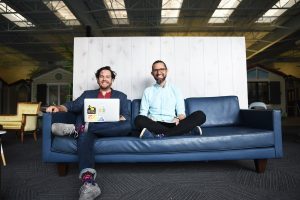
Omnimodal, a transportation tech startup co-founded by David Thomas Moran ‘14 and Nathan Selikoff ‘04, was one of nine finalists admitted into the Central Florida Social Enterprise Accelerator (CFL SEA) program committed to creating positive social change through entrepreneurship.
The first program of its kind in Central Florida, CFL SEA will help local entrepreneurs in the early stages of their product or business development. In addition to Omnimodal, four of the other selected projects are also headed by UCF alumni: EcoSpears, SnapGood, Fleet Farming, and Florida Abolitionists.
Each of the participating ventures will participate in a pitch event in March 2018 competing for a minimum $25,000 investment. The program, which includes six months of mentorship, access to professional services, tailored curriculum, and peer support, began last week.
Both Moran, who graduated with an MFA in Emerging Media, and Selikoff, an Art – Computer Animation BFA graduate, are alumni of the School of Visual Arts & Design (SVAD). Moran is also currently a fourth year student in the Texts & Technology Ph.D. program.
“It is pretty cool that we have that common tie back to SVAD. Omnimodal’s roots as a transportation tech startup are in public art”, said Moran. “Nathan and I actually met working on a public art project I started with Patrick Greene back in 2013 called the Transit Interpretation Project, or TrIP for short. Our goal then was to tell stories about public transit and increase visibility for the LYNX public bus system to hopefully encourage better service.”
As a social enterprise, Omnimodal’s mission somewhat follows in TrIP’s footsteps. Moran and Selikoff’s goal is to make transportation easier for everyone – starting with helping riders determine where their bus or train is in real-time.
Participants in CFL SEA aim to deliver tangible results and solve social, environmental, and economic societal challenges.
“We started Omnimodal to bring our creativity and technical backgrounds to bear on a problem affecting us and our community: a lack of real-time information about buses. This led us into a deeper understanding of the connections between Central Florida’s low-wage workforce, open data, and transit equity,” said Selikoff. “In a complex system where we will not be able to fix all of the structural issues at once, we can at least move the needle on the usability and dignity of our public transit systems by increasing access to the information riders, agencies and software developers need.”
With the emergence of private transportation apps like Uber and Lyft, current information presented in a user-friendly way has become the expectation for commuters. But even with Uber and Lyft creating a new option, Moran and Selikoff don’t think they are a replacement for public transit.
Moran and Selikoff believe public transit is key to fostering healthy, accessible, and sustainable communities. It drives Omnimodal’s dedication to building real-time information and other cutting-edge technologies as tools to keep public transit services relevant and reliable in the 21st century.
To follow along with the competition, visit www.cflsea.com